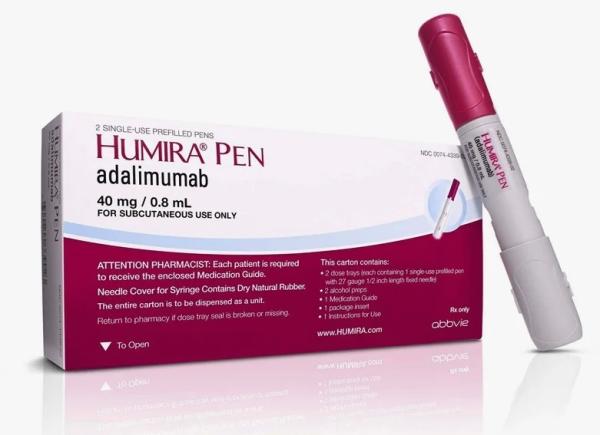- Bone Health
- Immunology
- Hematology
- Respiratory
- Dermatology
- Diabetes
- Gastroenterology
- Neurology
- Oncology
- Ophthalmology
- Rare Disease
- Rheumatology
Despite Steep Discounts, Humira Biosimilars Are Priced More Than Original Originator Price
The list price of Humira (reference adalimumab) has risen so dramatically over time that the list prices for new adalimumab biosimilars are now significantly higher than the original price of the originator, according to a report contextualizing net prices of adalimumab and the role of rebates.
Despite significant discounts from the current price of Humira (adalimumab), the launch prices of some adalimumab biosimilars are still double the launch price of the originator, according to a study published in JAMA Network Open.
Humira can be administrered in a prefilled syringe or autoinjector pen.

Throughout 2023, 9 FDA-approved adalimumab biosimilars are projected to enter the US market. As of the second week of July 2023, 8 had entered the market, beginning with Amgen’s Amjevita (adalimumab-atto) in January. Amjevita launched with a dual price strategy, where 2 versions of the drug would launch at 2 different prices (5% and 55% lower than the current price of Humira) to both entice pharmacy benefit managers (PBMs) to add the product to their formulary lists and to ensure patients without insurance could access the product.
The researchers said that despite the long period of anticipation for the entry of these products, no study has quantified net prices faced by payers after rebates for Humira. The current analysis is the first to contextualize the prices for biosimilars and enable estimation of savings associated with their entry.
For 2013 to 2020, the authors estimated several factors:
- The annual gross sales as the product of list price and units sold
- The difference between gross sales and company-reported net sales from SSR Health
- Medicaid and 340B discounts, accounting for the Medicaid best price
- Coverage gap discounts from the Medicare 5% sample
Government discounts through Medicaid, 340B programs, and coverage gap were subtracted and attributed to PBM rebates. Medicaid inflation rebates, which reimburse Medicaid for price increases above inflation, were also estimated separately for both citrate-containing and citrate-free Humira, the latter of which was introduced to the market in 2018.
Between 2013 and 2020, the list price of Humira rose from $1153 to $2784, a 141% increase. PBM rates for the drug also increased from $28 (2.4% of list price) to $973 (34.9% of list price). The average net price for commercial and Part D plans increased from $1125 to $1906, a 69% jump, between 2013 and 2018 before decreasing in 2020 to $1812 (65.1% of list price).
From 2013 to 2018, the base rebate for Medicaid was 23.1% of Humira’s list price. After 2019, PBM rebates grew, setting a new best price. Medicaid inflation rebates for the citrate-containing Humira increased from 38.6% of list price in 2013 to 69.6% in 2019. The Medicaid net price for citrate-containing Humira decreased from 38.3% of list price to 8.3% to 0% in 2013, 2018, and 2019, respectively. Inflation rebates were lower for citrate-free Humira, resulting in a significantly higher Medicaid net price.
Although there is 1 interchangeable adalimumab biosimilar on the market so far (Cyltezo), more are expected to come, including for Amjevita. The authors noted that while interchangeable adalimumab biosimilars present new opportunity for market competition, the ease with which an interchangeable product can be switched for another biosimilar may be dependent on the concentration and citrate-content of the product.
“These formulations may compete more directly on list price, marketing to pharmacies seeking to source lowest-cost product to generate a margin when reimbursed by an insurer at a predetermined amount for interchangeable formulations. However, the interchangeable biosimilars expected in 2023 will only be interchangeable with original Humira, but not the citrate-free version,” they wrote.
Additionally, several other companies launched their adalimumab biosimilars with list prices similar to Amjevita. Although the study only evaluated the list prices of Humira compared with Amjevita, the study conclusions can be extended to Yuflyma, branded Hyrimoz, Cyltezo, branded Hulio, and Idacio. The list prices for Hadlima, unbranded Hyrimoz, unbranded Hulio, and Yusimry are significantly closer to the original price of Humira and are about half of Humira's 2013 list price.
The researchers said their main limitations were only being able to analyze price changes through 2020 and lack of data to estimate discounts to federal purchasers.
Reference
Calip GS, Altomare IP, Guadamuz JS. Evaluating external validity of oncology biosimilar safety studies. JAMA Netw Open. 2023;6(4):e235776. doi:10.1001/jamanetworkopen.2023.5776
Newsletter
Where clinical, regulatory, and economic perspectives converge—sign up for Center for Biosimilars® emails to get expert insights on emerging treatment paradigms, biosimilar policy, and real-world outcomes that shape patient care.
